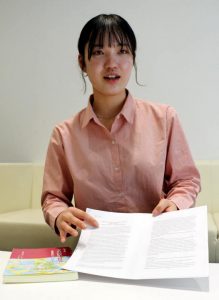Ms. Sadaiwa and 50 student volunteers to publish e-book about in-utero exposed survivors’ suffering next month
May 17, 2022
by Kana Kobayashi, Staff Writer
Shizuku Sadaiwa, 22, a senior at Kwansei Gakuin University who is from Hiroshima’s Minami Ward and now lives in Nishinomiya, Hyogo Prefecture, is working on translating accounts of in-utero exposed survivors of the atomic bombings into English. She has called on student volunteers from all over the country to form a translation group and is sharing the work. With Russia, which has invaded Ukraine, suggesting the use of nuclear weapons, she will release an e-book in June, saying she wants many people at home and abroad to read it.
She will translate a collection of memoirs entitled Umareta Tokikara Hibakusha (A-bomb survivor from birth), published in 2020 by a national association of in-utero exposed survivors. It conveys how about 50 A-bomb survivors who experienced the atomic bombing while in their mother’s womb, and are called “the youngest A-bomb survivors,” suffered discrimination, prejudice, and diseases.
When Ms. Sadaiwa listened to the testimony of Kazuhiko Futagawa, 76, a resident of Higashi Ward and head of the association during a practice in a university lecture on the theme of peace, she learned the suffering of in-utero exposed survivors, and decided to translate the collection of memoirs into English to convey it to many people. She called for cooperation from college students nationwide and formed a group August in 2021. She has been working with about 50 college students around the country.
The name of the group is AOGIRI, after the A-bombed Aogiri tree, which continues to convey the damage caused by the atomic bombing. In principle, one person translates one testimony. Ms. Sadaiwa said she was thinking of English expressions that could not be conveyed by direct translation, imagining the author’s experiences and thoughts. She referred to materials and other sources in the Peace Memorial Museum located in the city’s Naka Ward for the English translation of terms related to the war and the atomic bombing, such as “tearing down buildings to create fire lanes” and “Atomic Bomb Survivor’s Certificate.”
Mr. Futagawa, head of the association, said he was grateful that young people took in-utero exposed survivors’ experiences and thoughts so seriously when A-bomb survivors were growing elderly. Ms. Sadaiwa hopes that many people will read to make a society that does not use nuclear weapons under any circumstances.
More information about the e-book and other details can be found on the AOGIRI Website. https://aogirivoice08.wixsite.com/my-site-2
(Originally published on May 17, 2022)
Shizuku Sadaiwa, 22, a senior at Kwansei Gakuin University who is from Hiroshima’s Minami Ward and now lives in Nishinomiya, Hyogo Prefecture, is working on translating accounts of in-utero exposed survivors of the atomic bombings into English. She has called on student volunteers from all over the country to form a translation group and is sharing the work. With Russia, which has invaded Ukraine, suggesting the use of nuclear weapons, she will release an e-book in June, saying she wants many people at home and abroad to read it.
She will translate a collection of memoirs entitled Umareta Tokikara Hibakusha (A-bomb survivor from birth), published in 2020 by a national association of in-utero exposed survivors. It conveys how about 50 A-bomb survivors who experienced the atomic bombing while in their mother’s womb, and are called “the youngest A-bomb survivors,” suffered discrimination, prejudice, and diseases.
When Ms. Sadaiwa listened to the testimony of Kazuhiko Futagawa, 76, a resident of Higashi Ward and head of the association during a practice in a university lecture on the theme of peace, she learned the suffering of in-utero exposed survivors, and decided to translate the collection of memoirs into English to convey it to many people. She called for cooperation from college students nationwide and formed a group August in 2021. She has been working with about 50 college students around the country.
The name of the group is AOGIRI, after the A-bombed Aogiri tree, which continues to convey the damage caused by the atomic bombing. In principle, one person translates one testimony. Ms. Sadaiwa said she was thinking of English expressions that could not be conveyed by direct translation, imagining the author’s experiences and thoughts. She referred to materials and other sources in the Peace Memorial Museum located in the city’s Naka Ward for the English translation of terms related to the war and the atomic bombing, such as “tearing down buildings to create fire lanes” and “Atomic Bomb Survivor’s Certificate.”
Mr. Futagawa, head of the association, said he was grateful that young people took in-utero exposed survivors’ experiences and thoughts so seriously when A-bomb survivors were growing elderly. Ms. Sadaiwa hopes that many people will read to make a society that does not use nuclear weapons under any circumstances.
More information about the e-book and other details can be found on the AOGIRI Website. https://aogirivoice08.wixsite.com/my-site-2
(Originally published on May 17, 2022)








